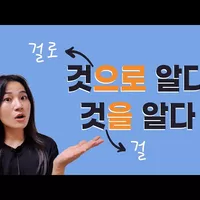(89) Korean grammar : 것으로(걸로) 알고 있다, 것을(걸) 알고 있다 (I know~~) - YouTube
(89) Koreanische Grammatik : 것으로(걸로) 알고 있다, 것을(걸) 알고 있다 (I know~~) - YouTube
(89) Korean grammar : 것으로(걸로) 알고 있다, 것을(걸) 알고 있다 (I know~~) - YouTube
(89) Gramática coreana : 것으로(걸로) 알고 있다, 것을(걸) 알고 있다 (I know~~) - YouTube
(89) Grammaire coréenne : 것으로(걸로) 알고 있다, 것을(걸) 알고 있다 (I know~~) - YouTube
(89) Korean grammar : 것으로(걸로) 알고 있다, 것을(걸) 알고 있다 (I know~~) - YouTube
(89) Korean grammar : 것으로(걸로) 알고 있다, 것을(걸) 알고 있다 (I know) - YouTube
(89) Koreaanse grammatica : 것으로(걸로) 알고 있다, 것을(걸) 알고 있다 (Ik weet het~) - YouTube
(89) Gramática coreana: 것으로(걸로) 알고 있다, 것을(걸) 알고 있다 (I know~~) - YouTube
(89) Грамматика корейского языка: я знаю это, я знаю это (я знаю) - YouTube
(89) Korece dilbilgisi : 것으로(걸로) 알고 있다, 것을(걸) 알고 있다 (I know~~) - YouTube
(89)韓語文法:我知道,我知道(我知道~~) - YouTube
안녕하세요 그냥 한국어 지은입니다
Hello, I'm Jieun in just Korean.
이번 영상에서는 '~것으로 알고 있다'
In this video, we will see ' 것으로 알고있다'
말을 할 때 '~걸로 알고 있다' 라는 표현 들어보셨을 거예요
you must have heard the expression '걸로 알고 있다'.
이것을 한번 볼 건데
I will look at this once,
이것을 비슷한 다른 표현인 '~것을 알고 있다'
but I think we should first compare two expressions such as '것을 알고 있다(걸 알고 있다)
'~걸 알고 있다' 라고 하는 표현을 같이 먼저 비교를 해보고
Compare these two similar expressions
'~것으로 알고 있다' 를 연습해야 할 것 같아요
and practice '것으로 알고 있다'.
먼저 '것을'이 들어가면 앞에 문장이 정말 사실인 문장이고요
First, if there is '것을' the preceding sentence is a true sentence.
'것으로 알고 있다고' 하면
When there is '으로', the sentence
'으로' 앞의 '것'에 해당하는 문장은
in front of '것'
주관적인 생각이기 때문에
is a subjective opinion,
맞을 수도 있고 안 맞을 수도 있어요
so it may or may not be correct.
그래서 가끔 오해를 했다, 잘못 생각했다
So sometimes I misunderstood,
이런 표현이 되기도 하거든요
It's often phrased like this
이거 사실 뒷부분 시제에 따라
This is actually the latter tense of
조금 한국인들이 다르게 생각을 하거든요
Koreans think a little differently.
주어가 '나'인 경우를 1인칭 이라고 하는데
When the subject is "me", it's called first person.
그 경우 주어가 '나'인 경우는
나는 안 하는 것으로 알고 있어. 현재 형이죠?
Ich weiß, dass ich es nicht weiß. Du bist jetzt mein Bruder, richtig?
I know I don't. I'm your brother now, right?
나는 안 가는 것으로 알고 있었어
I thought I wasn't going.
과거형이죠? 좀
두 가지가 다른 뜻이에요
첫 번째 나는 안 가는 것으로 알고 있어
지금 나의 생각이죠?
지금 나의 생각은 나에게는 확실한 정보이기 때문에
Because my thoughts right now are solid information for me, I'm going to use the
그 정보가 지금까지는 사실!
하지만 '나는 안 가는 것으로 알고 있었어' 라고 하면
알고 있었는데 가야 했어
라는 오해 뜻으로 보통은 쓰여요
그리고 두 번째는 3인칭 인데
이게 3인칭이 뭐냐면 다른 사람을 이야기할 때예요
그래서 예시를 보자면
제 이름을 넣어서
지은이는 안 가는 것으로 알고 있어
I know Ji-Eun isn't going.
지은이는 안 가는 것으로 알고 있었어
둘 다 지은이가 오해 했다는 뜻이에요
They both mean that Jijin misunderstood.
그러면 이 '~것으로 알고 있다'
앞부분, 뒷부분 바꿔서 연습을 해 볼게요
먼저 앞 부분 바꾸기 연습
수 있다, 수 없다
할 수 있는 것으로 알고 있어
오늘 볼 수 없는 것을 알고 있었어
기로 하다
저는 안 보기로 한 걸로 알고 있어요
저는 보기로 한 걸로 알고 있어요
그 다음 뒷부분 바꾸기
는데도
Even , Even if
내일 휴가인 걸 알고 있는데도 행복하지 않아
even though I know that tomorrow's vacation I'm not happy.
지만
But
공연이 취소 된 걸로 알고 있었지만 그냥 전화해 봤어
but I just called
아서/어서
because
네가 돗자리를 가져오기로 한 걸로 알고 있어서 나는 안 가져왔어
I knew you were going to bring a mat, so I didn't.
네가 돗자리를 가져오기로 한 걸로 알고 있어서 나는 안 가져왔어
이렇게 것으로 알고 있다는
앞부분과 뒷부분에 여러가지 문법을 붙일 수 있으니까
여러 가지 문법과 함께 만드는 연습을 하면
아주 도움이 돼요
그럼 오늘 영상에 관해 질문 있으시면
댓글을 달아 주시고
우리는 다음 영상에서 또 만나요
안녕히 가세요

